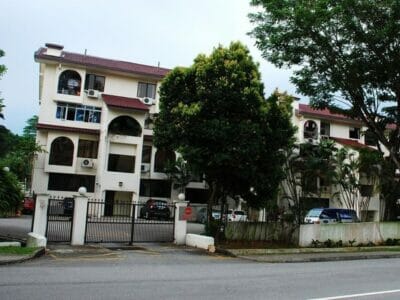
Singapore’s Goodluck Garden ran into some misfortune on its way to a collective sale
Leading today’s roundup of news from around the region, Singapore has reportedly pumped the brakes on a collective sale for the first time this year, as the disposal of a 210-unit housing development in the city-state’s West Region has been halted for the time being. China dominates the rest of the headlines, with a policy bank pressing pause on the redevelopment of urban shanty towns, and a Chinese-backed real estate group announcing a major investment in Dubai. And the country’s market for shared accommodation is expected to grow to $7.4 billion in just a couple of years, so read on for all the details.
Stop Order Issued for $446M Singapore En Bloc Sale
The collective sale of Goodluck Garden has been met with a stop order by the Strata Titles Board, the first this year to run into such a roadblock, after a group of seven minority owners objected. The stop order came after two rounds of mediation, BT understands.
The collective sale committee will have 14 days to apply to the High Court to seek approval for the sale, and if they do, it is believed that a hearing could happen in August or September. The 210-unit development with a gross floor area of 46,840 square metres along Toh Tuck Road was sold to the Qingjian Group of Companies for S$610 million ($446 million). Read more>>
Fidu Properties to Plough $544M into Dubai Projects
Fidu Properties, a Chinese real estate group, has announced that it plans to invest $544 million into Dubai’s real estate sector by the end of 2018, as part of its regional expansion strategy.
In a statement, the developer said that it would soon be introducing different real estate projects in Dubai to its list of high-profile investors. It added that it had recently signed multiple real estate deals worth $103 million with Emaar Properties for residential and commercial space – spanning 210,000sqft – in The Grand, a 62-storey skyscraper being built on Creek Island, as part of the Dubai Creek Harbour master development. Read more>>
China Halts Funding for Shantytown Redevelopment
China Development Bank (CDB) has halted funding for new shantytown redevelopment projects, and has transferred approval authority from its local branches back to the policy bank’s headquarters, a source at the bank told Reuters late on Monday.
The source said new funding is being reined in due to concerns about risks associated with rising debt for local governments, the primary recipients of the loans used to fund shantytown redevelopment. Existing projects are operating normally, said the source who spoke on condition of anonymity. Read more>>
China’s Co-Living Market Poised to Hit $7.5B by 2020
As Chinese tourists have begun to seek individualized and diversified accommodation, the transaction volume of China’s shared accommodation market is growing rapidly.
A research report shows that last year, China’s main shared accommodation platforms provided about 3 million units of domestic housing resources, and the transaction volume of the shared accommodation market was approximately RMB 14.5 billion ($2.2 billion), up nearly 71 percent year-on-year. This figure is expected to reach RMB 50 billion ($7.5 billion) by 2020. Read more>>
State Council to Conserve a Quarter of China’s Land
China aims to keep a quarter of its land off-limits for development by 2020 and increase forest coverage to more than 23 percent of its total landmass, the country’s cabinet said. At least 25 percent of China’s land would be protected by the country’s new “ecological red line” scheme by the end of this decade, the State Council said on Sunday.
China has published a slew of policy documents in recent months aimed at improving surveillance, strengthening law enforcement and raising industrial standards as it plans to extend its war on pollution until 2020. It has already ordered provinces to draw up detailed plans to curb construction and “irrational development” near rivers, forests and national parks. Read more>>
Property Builders Won’t Benefit from PBOC Rate Cut
The Chinese central bank’s move to inject RMB 700 billion ($106 billion) into the banking system through a reserve requirement ratio (RRR) cut will not help to ease liquidity concerns of property developers, as they will not be able to access the funds because of the heavy curbs imposed on them, say analysts.
The People’s Bank of China announced a 50 basis points cut in the RRR over the weekend, which takes effect from July 5, as part of a “targeted easing”. This means the freed up funds can only be used to support the implementation of debt-to-equity swap programmes and small and micro-sized enterprises, instead of across the board easing. Read more>>
Tune in again tomorrow for more news, and be sure to follow @Mingtiandi on Twitter, or bookmark Mingtiandi’s LinkedIn page for headlines as they happen.
Leave a Reply